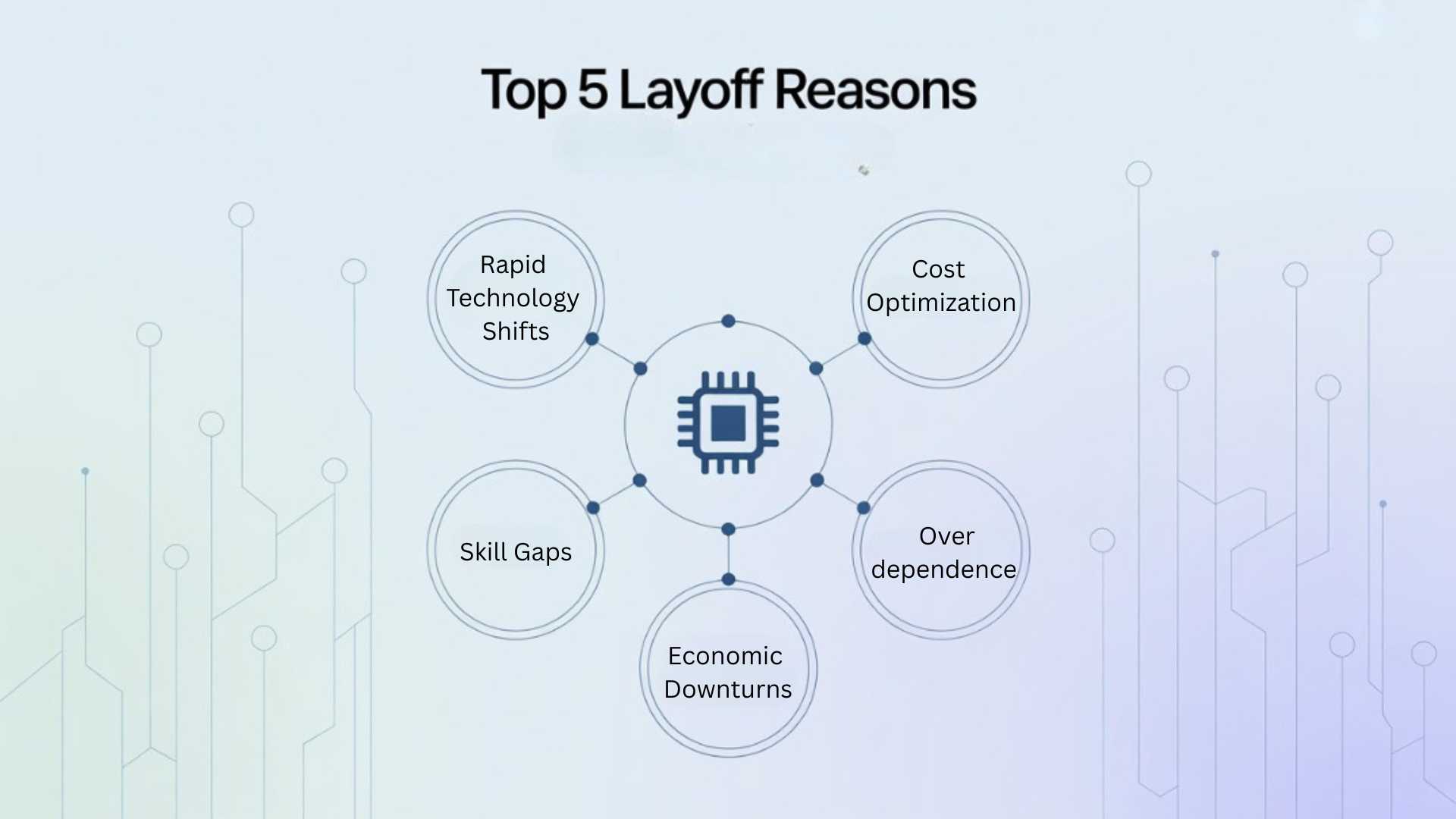The IT industry has always been a symbol of growth, innovation, and global career opportunities. However, in recent years, the trend of layoffs has shaken the confidence of many professionals. From freshers to experienced engineers, no one is entirely immune. Layoffs in IT are often triggered by business realignment, cost-cutting measures, or shifts in technology adoption.
For software testers, this reality is even more critical. As manual testing continues to shrink in demand, the need for upskilled professionals in automation, DevOps, and AI in software testing is stronger than ever. Let’s explore the top 5 layoff reasons in the IT industry and why upgrading skills with tools like Selenium, Playwright, and Generative AI is no longer optional but essential.
1. Rapid Technology Shifts
One of the biggest reasons for layoffs in IT is the fast pace of technology change. Companies are moving from legacy systems to modern cloud, AI, and automation-driven platforms. Employees who cannot adapt or reskill are often the first to be impacted.
For QA professionals, this means moving away from outdated manual practices and embracing automation and advanced testing frameworks. Without continuous learning, testers risk being replaced by those who can deliver faster and smarter results.
Recommended for You: selenium interview questions
2. Cost Optimization and Outsourcing
Global IT organizations constantly look for ways to reduce expenses. Outsourcing to low-cost markets, automation of repetitive tasks, and reducing workforce redundancies are common strategies.
In testing, repetitive manual tasks are being replaced by automated pipelines. Testers who don’t understand life cycle automation or CI/CD integration often fall behind, making them more vulnerable during cost-cutting exercises.
3. Skill Gaps in Modern Testing
Another top layoff driver is the growing gap between existing employee skills and the skills companies actually need. Businesses want QA engineers who can work with cloud-based testing, containerized environments, and AI-driven testing tools.
This is where upskilling becomes critical. Enrolling in training programs, certifications, and workshops ensures testers stay relevant and ready to take on advanced roles rather than being left behind.

4. Economic Downturns and Market Uncertainty
Global recessions, inflation, or sudden market slowdowns push companies to scale back operations. While these are beyond individual control, professionals with niche and in-demand skills still enjoy greater job security.
For example, testers skilled in playwright automation testing or AI-driven validation tools are often retained because they directly contribute to productivity and business agility.
5. Overdependence on Manual Testing
Within the testing domain, over-reliance on manual testing is a direct reason many QA professionals face layoffs. Companies want faster releases, continuous integration, and zero-defect delivery pipelines—something manual testing alone cannot guarantee.
This shift highlights the urgent need for automation skills, hands-on expertise with frameworks, and knowledge of integrating AI into testing workflows.
Deep Dive: How QA Professionals Can Avoid Layoffs
While layoffs are influenced by external factors, QA professionals can reduce their risk by staying updated with modern testing tools and practices. Let’s break it down by key areas:
Selenium: The Evergreen Automation Tool
Selenium remains one of the most in-demand automation testing frameworks. It supports multiple browsers, programming languages, and CI/CD integrations, making it a must-learn tool for testers.
For professionals in India, upskilling through selenium training in chennai or other specialized programs can provide hands-on knowledge and practical projects. This training ensures you can design robust automation frameworks, integrate with pipelines, and handle real-world challenges—making you less likely to face job cuts.
Playwright: The Next-Gen Testing Framework
Playwright automation testing is quickly rising as a preferred tool for modern web applications. Its ability to handle cross-browser automation, parallel execution, and network interception makes it more advanced than traditional tools.
By learning Playwright, testers not only future-proof their careers but also prove to employers that they can deliver faster, reliable automation for complex systems. Organizations increasingly prefer testers who can work with Playwright, reducing the chances of redundancy.
Popular Articles: automation testing interview questions
Generative AI: Transforming Software Testing
The rise of AI in software testing is another game-changer. Generative AI can create test scripts automatically, detect anomalies, and even simulate user behavior. This drastically reduces the time QA teams spend on repetitive tasks and increases test coverage.
For QA professionals, learning how to leverage Gen AI tools means stepping into a hybrid role—part tester, part innovator. By aligning with AI-driven testing strategies, testers ensure they stay relevant and indispensable to their organizations.
Conclusion
Layoffs in IT are driven by many factors, including technological changes, cost optimization, and evolving skill requirements. But for software testers, the message is clear—manual-only expertise is no longer enough.
To secure long-term career stability, testers must upskill in automation frameworks like Selenium and Playwright, and embrace AI in software testing as the future. By doing so, they can transform themselves into high-value professionals who are far less vulnerable during uncertain times.
FAQs
Q1. What are the top reasons for layoffs in the IT industry?
Layoffs in IT often stem from rapid technology shifts, cost optimization, outsourcing, skill gaps, economic downturns, and overdependence on outdated manual testing practices.
Q2. How can software testers avoid layoffs?
Testers can secure their jobs by upskilling in automation frameworks like Selenium and Playwright, embracing CI/CD, and leveraging AI in software testing.
Q3. Why is manual testing no longer enough in IT?
Manual testing alone cannot keep up with faster release cycles and zero-defect demands. Companies prefer testers skilled in automation and AI-driven testing.
Q4. Is learning Selenium still important for testers?
Yes. Selenium remains one of the most widely used automation tools, supporting multiple browsers, languages, and CI/CD pipelines, making it crucial for long-term career growth.
Q5. What role does Generative AI play in QA testing?
Generative AI helps create test scripts, detect anomalies, and simulate user behavior, improving coverage and efficiency while reducing repetitive tasks for QA teams.
We Also Provide Training In:
- Advanced Selenium Training
- Playwright Training
- Gen AI Training
- AWS Training
- REST API Training
- Full Stack Training
- Appium Training
- DevOps Training
- JMeter Performance Training
Author’s Bio:

Content Writer at Testleaf, specializing in SEO-driven content for test automation, software development, and cybersecurity. I turn complex technical topics into clear, engaging stories that educate, inspire, and drive digital transformation.
Ezhirkadhir Raja
Content Writer – Testleaf







